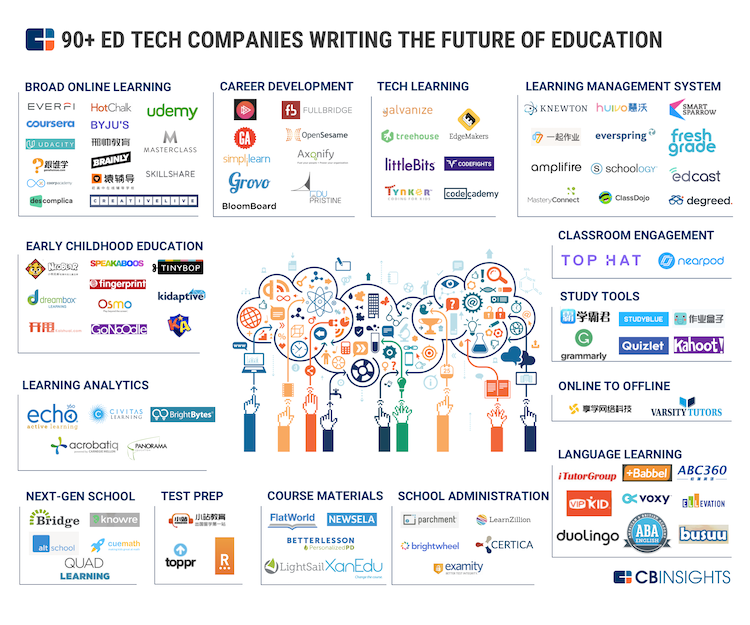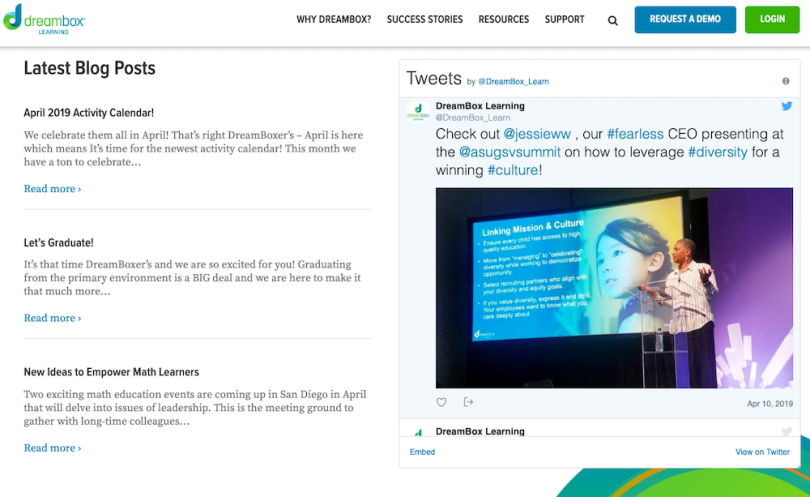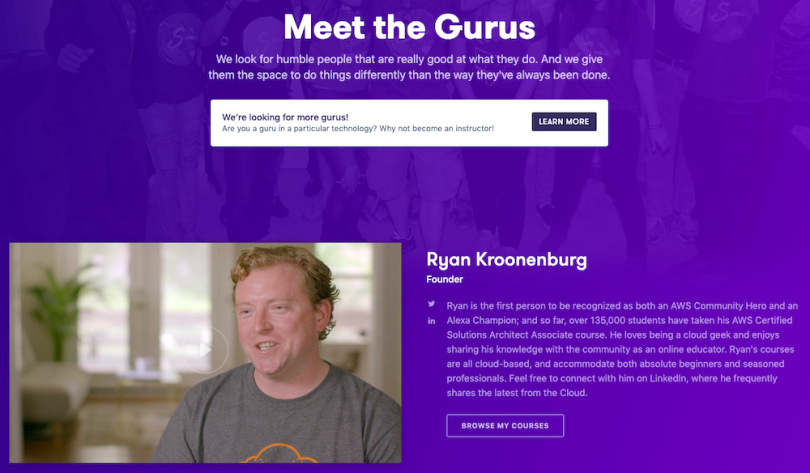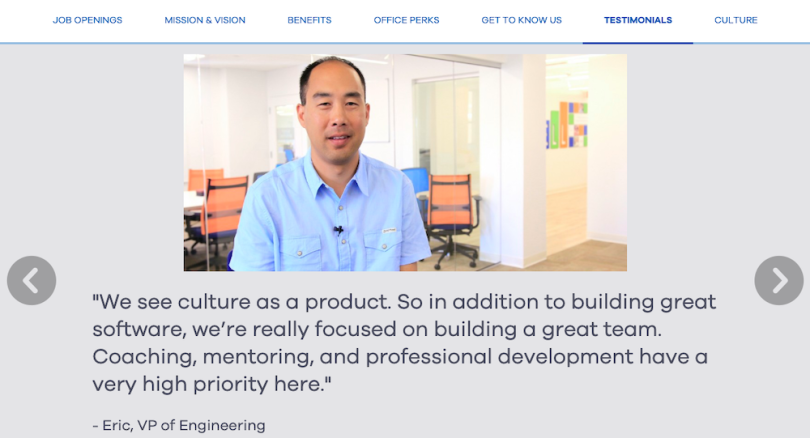The Edtech industry has fundamentally changed the way people across the planet learn and develop.
As more and more people take to digital channels to further their education and learn new skills, the Edtech industry has growth like never before.
Of course, for Edtech companies, that also means that there’s more competition for talent than ever before, too.
Given the competition associated with recruiting in Edtech, we created this guide to provide an overview of the industry, highlight the most in-demand roles in 2020 and go over a few examples of Edtech companies that are nailing the recruiting process.
See how your employer brand is performing in AI tools like ChatGPT and Google.
Table of Contents
- Edtech Industry Breakdown
- The Most In-Demand Roles in Edtech
- 9 Edtech Companies Recruitment Examples
EdTech Industry Breakdown
Before we dive into the nuts and bolts of recruiting in Edtech, let’s take a minute to review the industry as a whole in order to help us better understand recruitment trends.
Edtech Continues to Fragment
EdTech has become a massive industry with a wide range of sub industries working together to bridge gaps and support education organizations around the world. CB Insights breaks the Edtech industry down as follows:

More than half of the 90+ EdTech companies on this list fall under the following categories:
-
Broad Online Learning (15 companies)
-
Learning Management Systems (12 companies)
-
Early Childhood Education (10 companies)
-
Career Development (9 companies)
-
Language Learning (9 companies)
HolonIQ also broke down the Edtech industry by combining machine learning with human expertise to organize the different branches. You can delve a bit deeper into their interactive graph to see which Edtech companies fall under a wider range of sub categories based on their criteria. Below are the areas with the largest number of companies:
-
Assessment (18 companies)
-
Language Learning (17 companies)
-
Extended Reality (17 companies)
-
Learning Environment (17 companies)
-
Education Management Platforms (16 companies)
As the industry continues to fragment into unique niches, companies will need candidates with a wider array of expertise and experience than ever before.
EdTech funding is on a roll
In 2018 the Edtech industry raised $4.46 billion with 187 deals. The number of Edtech companies funded, however, declined from 165 deals in 2015 to 112 in 2018, meaning investors are spending more on fewer companies.
EdSurge's 2018 EdTech Funding Breakdown by Round

In terms of funding by round, in 2018 Angel and Seed investors closed the most deals (45), totaling $110.4M. While Series C+ investors closed only one third the total number of deals (15), they closed nearly five times the dollar amount at $537.2M.
This breakdown provides strong indicators of two key trends:
-
A large number of companies receiving angel and seed funding indicates that there is still significant growth happening among early Edtech companies.
-
At the same time, there is a large dollar amount coming from Series C+ investors, meaning there is also a growing number of Edtech companies scaling up.
With both new entrants and established businesses entering fast growth mode, competition for talent in the Edtech space will only intensify, making life that much more difficult for recruiters.
predicting Edtech's Future Talent Needs
Sure, we know where the EdTech market is now, but wouldn't it be more useful if we could predict where it’s going? According to HolonIQ, advanced technology like augmented reality/virtual reality, artificial intelligence, robotics and blockchain will become major components of core products and processes in the Edtech industry by 2025. In particular, AR/VR and AI in Edtech are predicted to more than quadruple over the next six years.

The Most In-Demand Roles in EdTech

You can’t hope to successfully recruit in Edtech until you understand the industry's competitive landscape. To shed some light on the issue, we analyzed Edtech jobs data from our seven local communities to understand the supply and demand fundamentals driving the labor force. Given that we specialize in the technology industry, we did not include educational (teacher, tutor, etc.) positions in our analysis.
We’ve broken our findings down into more detail below, but at the top line our analysis found that five broad roles account for more than 77% of the open positions in the Edtech industry. These are the hires you’ll have to fight the hardest to make.

Software Engineering
According to our analysis, more than 25% of all open roles in the Edtech space are for software engineering positions, making this the most in demand field in the industry. This makes sense, given that technology underpins nearly every product and service in Edtech.
But software engineering is a broad term that encompasses many different disciplines, so we dug a little deeper to identify the most in demand coding languages, frameworks and libraries in the field. These are measured by the percentage of analyzed job descriptions that include the discipline as a requirement.
-
Javascript - 63.71%
-
Python - 24.21%
-
Java - 22.30%
-
Ruby - 21.49%
-
Linux - 15.30%
Sales
Given the growth trend we discussed in the previous section, it should come as no surprise that sales roles represent more than 21% of the open positions in the Edtech industry. It’s predicted that the Edtech industry will grow to $252 billion by 2020, and as companies grow, so too do sales quotas. That typically means more headcount.
Again, we broke this category down into the most in demand subsets to paint a more comprehensive picture.
-
Account Executive - 32.08%
-
Sales Development Representative - 30.19%
-
Account Manager - 13.21%
Operations
Operations ranked as the third most in-demand position in Edtech, accounting for just under 12% of all open roles. But in this instance, demand is more narrow than it first appears.
When broken down by discipline, we see that two specific roles account for more than 90% of open operations positions.
-
Customer Success - 67.57%
-
Customer Support - 24.32%
Marketing
At the time of publication, marketing accounted for just over 10% of all open roles in the Edtech industry. This makes sense, given the trends we’ve already discussed.
As the industry matures, established Edtech companies are likely spending more on marketing to maintain growth. Additionally, larger marketing operations are needed to support the growing sales teams Edtech companies are building out.
Product
Finally we come to product, which accounts for more than 8% of all open roles in the Edtech space. As Edtech companies strive to maintain growth and win new customers, they’re constantly adding new products and features to their offerings. This rapid development is only possible thanks to teams of dedicated professionals working behind the scenes to ensure the work is done on time and to spec.
9 EdTech RECRUITing Examples
When it comes to how Edtech companies should be recruiting for these in-demand roles, there’s no right or wrong answer. Whatever works, works. That being said, we’ve rounded up nine real-world Edtech recruitment examples to help get your creative juices flowing.
Guild Education Repurposes Recruiting Content

Like many Edtech companies, Guild Education is hiring for a variety of roles, but it’s placing special emphasis on software engineers. To that end, the company created this long-form blog post on Medium. The content provided insider knowledge on the company’s engineering team, and Guild was then able to repurpose the content on LinkedIn (left image) and Twitter (right image) to reach a wider audience. Win-win.
DreamBox Keeps it Current on Twitter

DreamBox keeps their homepage active with a live Twitter feed that allows them to share their content without any extra work. This Tweet in particular focuses on two topics candidates strongly consider when looking into new companies — culture and diversity. They also make sure to share open roles and highlight company culture on their social accounts as well.
TPT Utilizes Instagram for Recruiting

Rather than sharing company culture and employer branding material here and there, Teachers Pay Teachers (TPT) created a dedicated Instagram account for recruiting. It incorporates content around their culture, people, mission and more.
RedShelf Films a Recruiting Video
In this recruitment video, candidates hear from RedShelf's team about why they love working for the mission-oriented company and how their roles contribute to their greater goals. Recruitment videos are great for providing first-hand feedback from employees, and it's content that can be repurposed across platforms and for different open roles.
BenchPrep Founders Tell Their Story

BenchPrep's founders dove deep into the founding of the company as well as its current state in a candid article that covered everything from how they met to answering questions for candidates like:
How have your leadership styles evolved as BenchPrep has grown?
What makes BenchPrep’s culture unique?
What makes someone a good culture fit?
GoGuardian Builds a Talent Community

GoGuardian knows the value of creating a talent community. By adding a simple form like this to their careers page, they are able to stay in contact with interested candidates when roles open up that match their interests and experience.
Jumpcut Writes In-Depth Blogs

Jumpcut created a corporate blog series to share the ins and outs of their company and culture. This article in particular delves into the different facets of the company that make their culture unique based on five mantras (or core values). Beyond stating their values, they explain how they live them in their daily lives.
A Cloud Guru Introduces the Founders
A Cloud Guru are extremely proud of their story, mission and culture. Their careers page is loaded with video and written interviews with the brothers who founded the company after getting rejected from a job at Amazon.

They also have video interviews with six different team members on their Meet the Gurus page, who share their love for the company and how they make an impact every single day.
Ellevation Education Shares Employee Testimonials

While Ellevation Education has a variety of recruitment videos on their careers page, they also incorporate written employee testimonials as well for a variety of content. This is also a great alternative for employees to share their insight even if they aren't as comfortable on camera.





